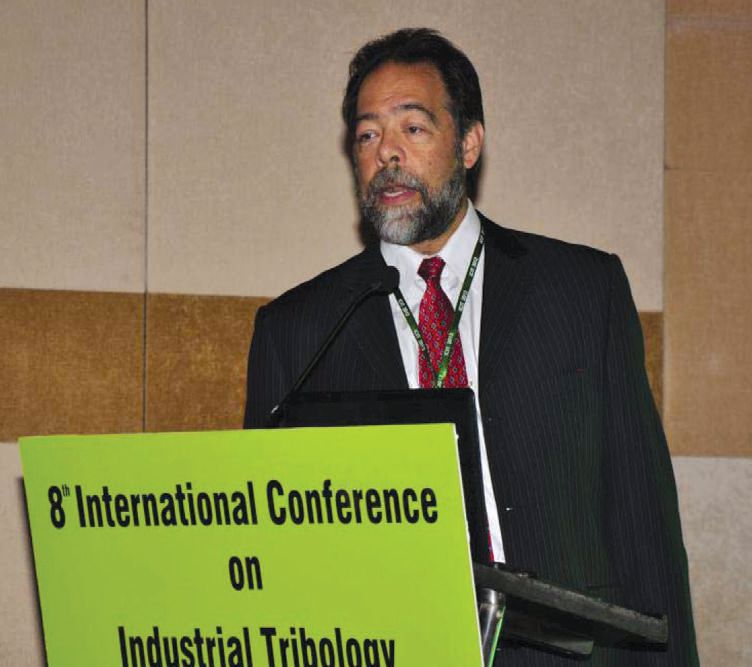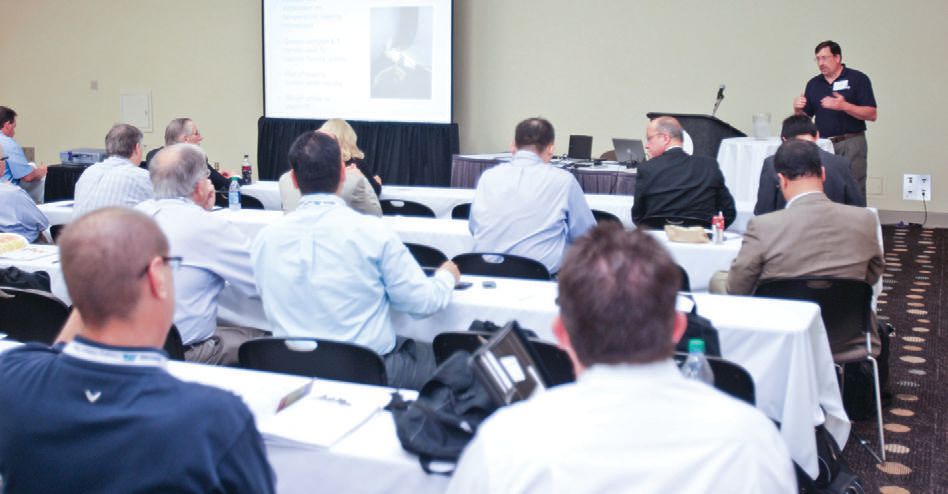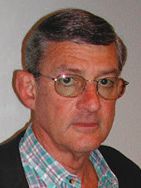Going Global
Dr. Robert M. Gresham | Commentary April 2013
A professional society’s reach should extend its grasp—as STLE is proving with major initiatives across the world.
KEY CONCEPTS
•
STLE is expanding its reach with major initiatives and programs in Asia, Europe, Latin America, Africa and the Caribbean.
•
Key elements of the initiative include participating in international conferences and exchanging information in digital publications.
•
Once acknowledged primarily as a North American benefit, STLE’s CLS certification now is being recognized around the world—with the exam now offered in English, German and Spanish.
ONE OF THE CURRENT THEMES, when talking with people in our industry, is the global shifting in business and the emergence of various countries, both academically and commercially. STLE’s leadership recognized the early beginnings of these shifts way back in 1987, when we changed our name to STLE from ASLE, dropping the American emphasis.
At that time, most of our global relationships centered in the academic community with early relationships with the Japanese Society of Tribologists and various academic groups in Europe. These early relationships typically involved publishing technical papers and attending conferences to present these papers.
Soon afterward we developed a relationship with the South African Institute of Tribology (SAIT) and with
Fuels & Lubes Asia magazine (the first commercially oriented group). With SAIT we began administering the CLS™ exam and exchanging technical information in a cost-effective manner such as publishing their research in
Lubrication Engineering (TLT’s predecessor). This has now become much easier with the advent of digital versions of our magazine and journals. With
Fuels & Lubes Asia, we held a number of education courses and attended its conference.
Not long after that, STLE, under the leadership of board member Kuarlal Rampersad, established the Caribbean Section based in Trinidad. This highly successful section has hosted numerous education programs, scholarships and related student programs, not to mention fielding a cricket team and winning STLE’s annual award for best local section.
From these humble beginnings, STLE now not only supports but has even once been honored to host the World Tribology Congress. In Asia we now also have collaborative relationships with the Korean Society of Tribology and the Chinese Tribology Institute (CTI). Indeed, one of CTI’s key people, professor Jianbian Luo, Changjiang Professor, Tsinghua University, Beijing, director of the State Key Laboratory of Tribology and chairman of CTI, is being honored at STLE’s annual meeting next month with our prestigious International Award.
Further in Asia, STLE and the Tribology Society of India (TSI) have developed a growing collaboration involving education courses, joint publishing, participation in conferences and the administration of the CLS exam. At the recent 8th International Conference of Industrial Tribology in Pune, India, STLE Past President Dr. Ed Becker gave a presentation on automotive trends in a plenary session and also taught a segment in the automotive education course. President Jerry Byers also gave a plenary presentation on “Sustainability in Manufacturing and Development.”
The TSI conference was attended by an international audience of more than 200 people from nine countries. It included three plenary sessions of seven presentations, 16 technical sessions of 64 papers, 38 student poster presentations and 17 exhibits. STLE anticipates participating in the AsiaTrib 2014 conference in New Delhi, India.
 STLE Past President Ed Becker recently discussed automotive trends at a conference sponsored by the Tribology Society of India. The two organizations have a growing collaborative relationship involving education, publishing, conferences and the CLS exam.
EUROPEAN INITIATIVE
STLE Past President Ed Becker recently discussed automotive trends at a conference sponsored by the Tribology Society of India. The two organizations have a growing collaborative relationship involving education, publishing, conferences and the CLS exam.
EUROPEAN INITIATIVE
Moving from Asia to Europe, as I reported earlier in this column, in 2011 STLE participated in the Union of European Lubricant Industry conference—4th Symposium on Metal Removal Fluids: Global Challenges.
Last June STLE participated in the LubMat ’12 conference in Bilbao, Spain. With the able assistance of STLE-member and TLT columnist Dr. Neil Canter, STLE presented a one-day education course on Metalworking Fluids: Key Concepts in Developing, Using and Maintaining Metal Removal Fluids. STLE also had a booth in the trade show area and participated in the conference, which again was well attended by an international audience.
This January STLE also participated in the 2nd Oil Doc Conference in Rosenheim, Germany. Again, attendance was up from the first conference by about 10% to around 450 people, with numerous trade show exhibits and a three-track technical program that included both commercial and non-commercial content and an opening keynote session. STLE presented in the program, maintained a trade show booth, and the CLS exam was administered at the end of an education course.
Finally, STLE is developing new relationships in Latin America and Ghana, recently establishing local sections there. So as you can see, STLE continues to “go global.”
Why have we had these successes?
As always, there is no simple answer, but certain themes do seem to resonate: education and the sharing of information by industry experts. Initially, these efforts were in the classic face-to-face format, which is still popular, but now the advent of Webinars, podcasts and Skype are bridging the problems of distance, cost and time zones. Further, for those learning English (which seems to be the generally accepted international language), recorded Webinars and podcasts, along with the digital TLT,
Tribology Transactions and
Tribology Letters, provide content that can be accessed at the individual’s pace and convenience.
Certification is growing in popularity, as people the world over, especially those doing business in multiple countries, seek a more universal recognition of their expertise. A key to this effort is making the exams available in other languages. Currently STLE offers a German version of the CLS exam, and we are nearly finished with a Spanish iteration. These exams are sufficiently difficult, and asking candidates to take it in a language not their own makes it unreasonably difficult.
 One key element to STLE’s global initiative still resonates and that involves education and sharing of information by industry experts.
One key element to STLE’s global initiative still resonates and that involves education and sharing of information by industry experts.
Forming international connections is another critical aspect of STLE’s global initiative, as people and companies are expanding their sales and manufacturing efforts to global markets. People need to make credible contacts in other countries to facilitate their businesses. This is true of the academic as well as the corporate community. Connecting through these activities allows people to meet and develop relationships with consultants, technical experts, vendors, test labs, custom manufacturers and others.
Finally, recognition grows from all these efforts. STLE recognition establishes who are the credible experts, suppliers and so forth.
Thus, participation in all these events—going global—helps STLE meet its vision to be a leader in the global network of individuals, institutions, societies and corporate entities with a common interest in advancing the science of tribology and the practice of lubrication engineering.
 Bob Gresham is STLE’s director of professional development. You can reach him at rgresham@stle.org
Bob Gresham is STLE’s director of professional development. You can reach him at rgresham@stle.org.